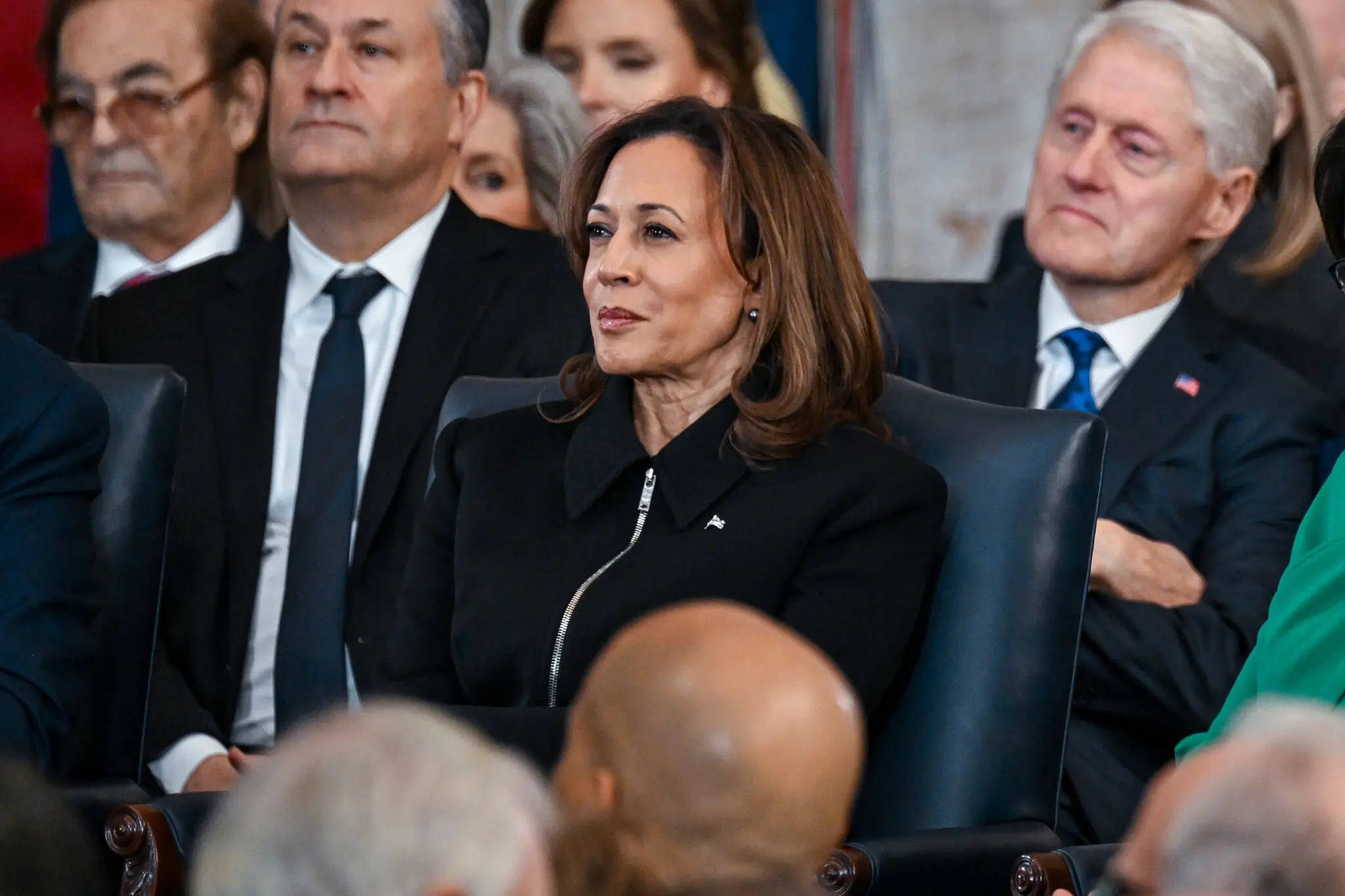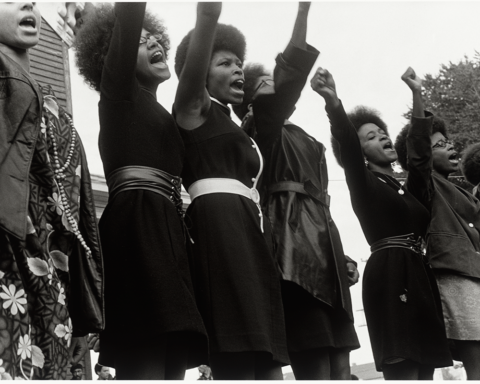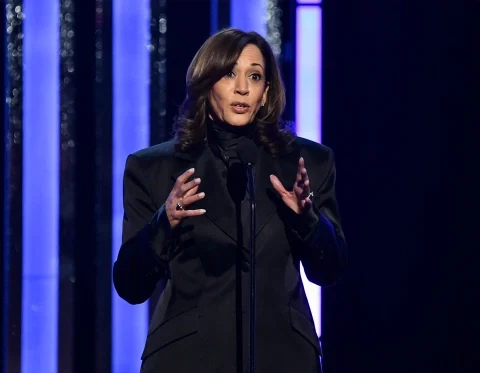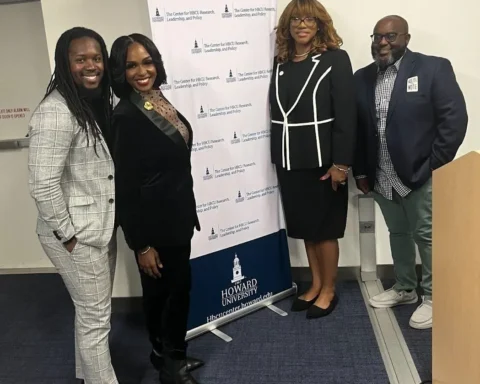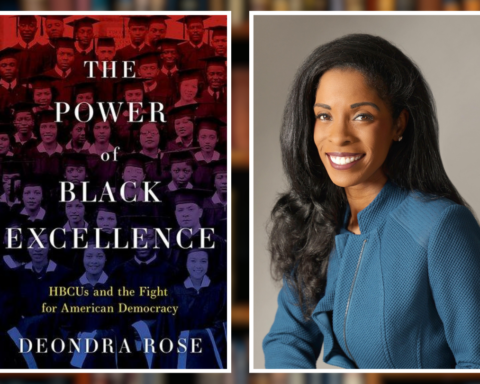By Erica Greene
Former Vice President Kamala D. Harris left Washington on Monday the way she entered her role on the same day five years ago: making history.
After President Trump’s inauguration, Ms. Harris headed to Joint Base Andrews to take her last official flight home to California, supported by an all-female U.S. Air Force crew — the first time such a crew has operated a C-32 aircraft for the military branch, according to an aide.
It was a fitting end for a barrier-breaking vice president who rarely presented herself as such, a subtle nod to her historic ascendancy to the second-highest office in the nation.
When she arrived in California, Ms. Harris will visit a fire station to thank firefighters who have been on the front lines of the wildfires that have torn through Los Angeles, putting even her own home in danger. She will also join the staff of the World Central Kitchen charity in distributing food to communities affected by the blazes.
Ms. Harris’s first acts as a nonelected official for the first time in decades could be indicative of what comes next.
She has not directly addressed her loss to Mr. Trump nor publicly spoken about her plans after leaving office.
“I’ll keep you posted,” she said when asked last week, after she signed her name — the first woman’s — to the ceremonial desk signed by vice presidents since 1940.
As she headed home, Ms. Harris launched a new website outlining her accomplishments throughout her political career. It signaled what many say she has demonstrated time and again, and she recently reiterated at the desk signing.
“It is not my nature to go quietly into the night,” she said. “So don’t worry about that.”
Ms. Harris has told close friends that she is exploring three options, according to a person familiar with her thinking. She will either run for governor of California in 2026, for president again in 2028 or for nothing at all.
In California, Ms. Harris is seen by many as a fighter who would easily gain support should she want to pursue public office again, allies said.
“She’s returning with her head high and Democrats very proud of the job she did,” said Mark Buell, a prominent Democratic megadonor in the state, who helped run Ms. Harris’s previous campaigns. “I don’t think you’ll find anyone who thinks she could have fought harder for the presidency.”
A commitment to duty and democracy defined her last weeks in office. Ms. Harris certified the election that she lost, drawing a stark contrast to four years ago, when her opponent incited a violent mob to derail the process when she took office. Instead of a trip to several countries, which she canceled to tend to the wildfire response, she made a series of calls to world leaders. And on Monday, she fulfilled her obligations to welcome the new administration to Washington, even after a bitter campaign in which its supporters attacked her personally, often with tinges of racism and sexism.
“Clearly, she was held to a standard that no other vice president of a country was held to, and she rose to the occasion,” said LaTosha Brown, the co-founder of the voting rights group Black Voters Matter. “And she left that office with her character intact.”
During her first two years, Ms. Harris had a number of stumbles. She struggled to articulate policy positions on issues like immigration and was sidelined in the administration on big decisions. Her office was rife with dysfunction.
But she emerged as a crucial partner for President Joseph R. Biden Jr., which was demonstrated when he handed her his candidacy — and his legacy — when he dropped out of the presidential race in July.
Before then, Ms. Harris played an integral role in some of Mr. Biden’s other legacy-defining decisions. She pushed him to express more sympathy for Palestinians in the Israel-Gaza war and to be more aggressive in communicating the administration’s accomplishments. She took on the task of galvanizing the country around generational issues like reproductive rights when he could not, and she played a role in his recent record-breaking clemency actions for people serving long prison terms for nonviolent drug offenses.
She also played a pivotal role in Mr. Biden’s nomination of the first Black woman to serve on the Supreme Court.
“We might not be able to write her story or legacy tomorrow, but I will tell you that generations yet unborn will know that she sat in a powerful seat, and she used that seat wisely and admirably,” said Minyon Moore, a longtime Democratic adviser and close confidant of Ms. Harris’s.
Ms. Moore added that she thought Ms. Harris would inspire future leaders to become and stay involved in public service.
“The greatest thing you can give to a country when you are a first is to ensure that you will never be the last,” Ms. Moore said. “She has done that.”
In the White House, Ms. Harris’s influence on policy was sometimes shrouded in the shadows of being second in command. She was widely seen by activists and advocates as a bridge to power, allowing them access to the White House to champion their issues that they never had before.
“There was a quiet force in how she moved throughout that White House,” said Ms. Brown, who worked with the vice president on voting rights. “You couldn’t even get to the depths of what she contributed because of all the white noise.”
While Ms. Harris’s portfolio was seen as something of a quagmire, she became the chief domestic policy spokeswoman for the administration. Mr. Biden had assigned her the “root causes” of migration, which inexplicably branded her the “border czar” responsible for the migrant crisis. But she quickly carved out a role for herself by taking on some of the country’s intractable issues.
Ms. Harris championed policies such as the child tax credit, removing the burdens of medical debt and bolstering worker’s rights. She also took on the issues of gun violence prevention, leading the White House’s first federal office dedicated to the cause, climate change, and U.S. policy advances on artificial intelligence.
“It was strange when people would say, ‘I don’t know what she was doing,’” said Joel K. Goldstein, a longtime expert on the vice presidency at St. Louis University School of Law. “If you were covering her, or you Googled her, you would see — it was all there. And the fact that she was taking on those international assignments showed you that Biden valued her enough to give her significant platforms.”
Ms. Harris’s role in shaping foreign policy received less recognition, including her presence on the world stage.
The administration looked to her to deliver some of its most consequential messages to the world, such as warning at the Munich conference in 2022 that Russia was preparing to invade Ukraine and announcing the U.S. determination that Russia had committed crimes against humanity in Ukraine at the same conference in 2023. Ms. Harris also used her high-profile appearance in Selma, Ala., last year to call on Israel to increase the flow of humanitarian aid into Gaza and for a cease-fire.
Azali Fortier, a 17-year-old sophomore at Spelman College who introduced Ms. Harris in Selma and locked arms with her as they walked over the Edmund Pettus Bridge, said on Monday that Ms. Harris had instilled a sense of “militancy” in young people. Watching her leave the White House after a hard-fought campaign, in which she displayed “grace and integrity,” taught a valuable lesson, Ms. Fortier said.
“Her leaving reminds us that we are to be strong in times like this, but we should never forget where we came from, and we should keep that in mind when we’re looking to where we go next,” Ms. Fortier said. “She let us know what it was — that this is the world that we have to be prepared to fight to live in, not just live in.”
Whether she was in Africa building relations to blunt the economic impact of China and Russia or strengthening alliances in the Indo-Pacific, Ms. Harris was often focused on people whose voices were not being heard and thinking about issues that would arise years down the road.
“Another thing that she has done throughout her career domestically is making sure that all voices are heard, and everyone gets a seat at the table,” said Philip H. Gordon, who was Ms. Harris’s national security adviser. “All demographics, races, income levels, genders, often standing up for the little guy against the big guy. And I think that instinct applies to international relations as well.”
And she has laid a path that others can follow.
“Prior to the 2020 election, the United States had no playbook for a woman serving as vice president of the United States — the playbook now exists,” said Donna Brazile, a longtime Democratic analyst.
“The glass ceiling has been crushed, shattered,” she added, “and will soon be long forgotten as a hidden barrier that once stated women should not apply.”

